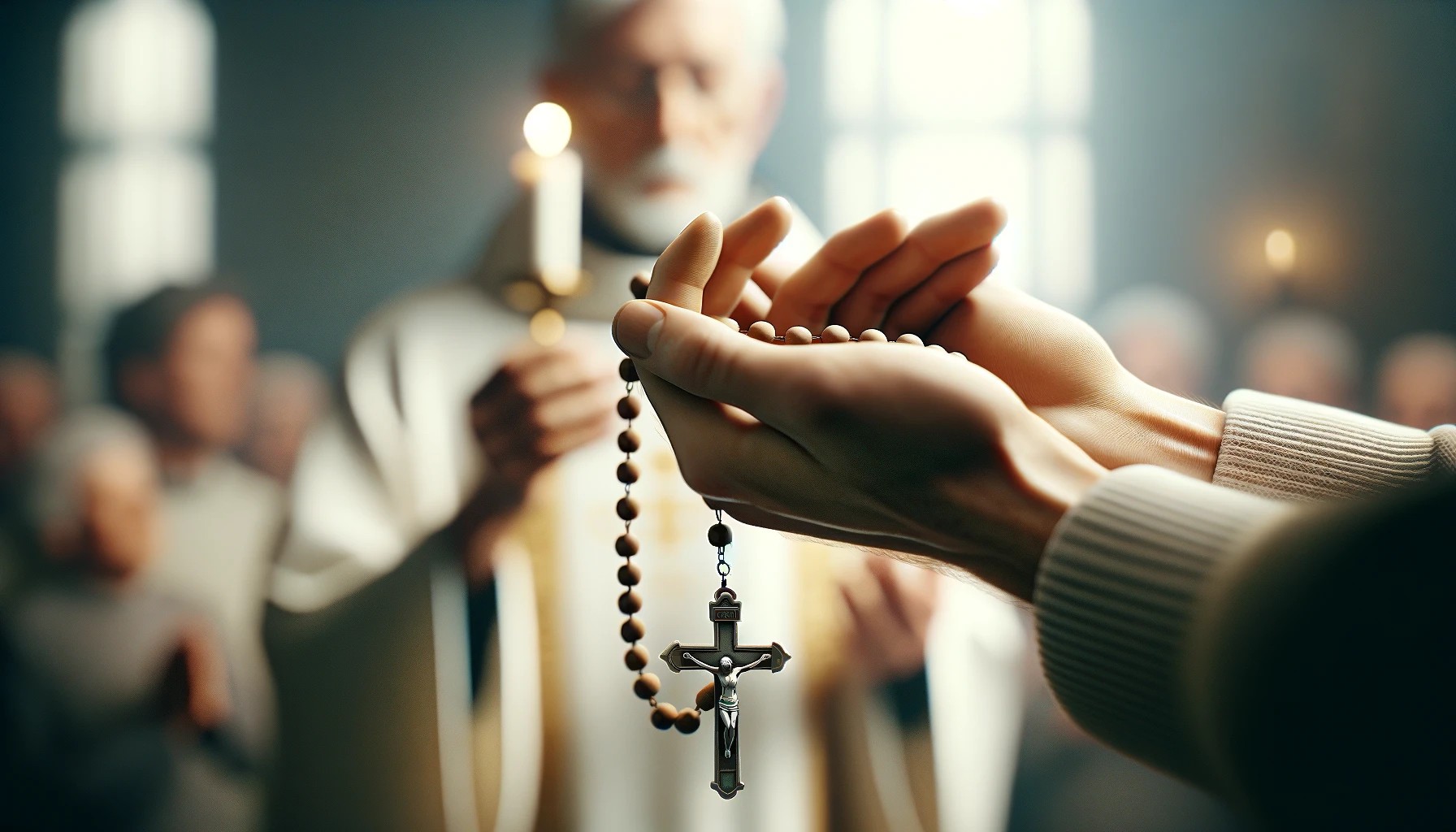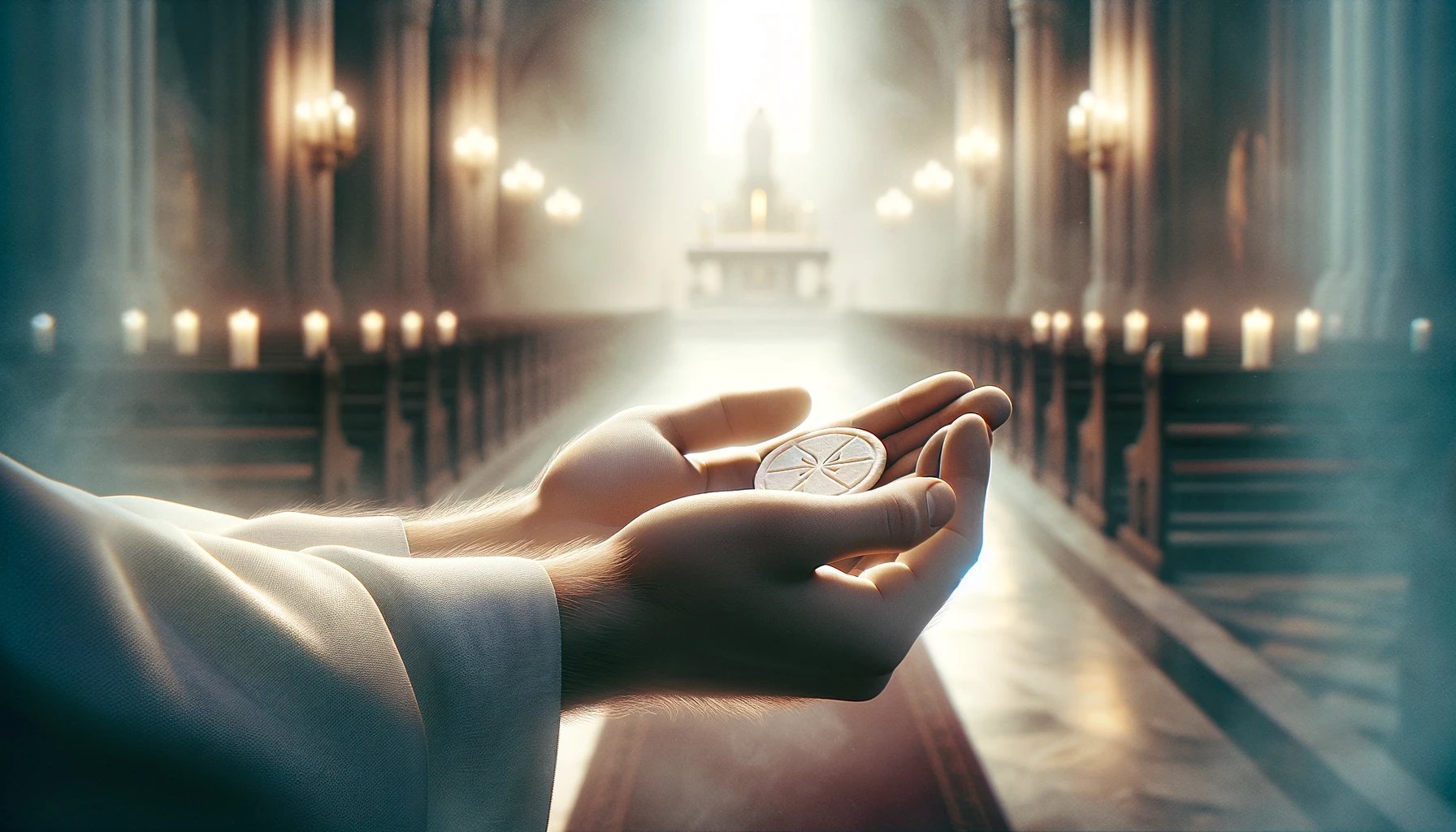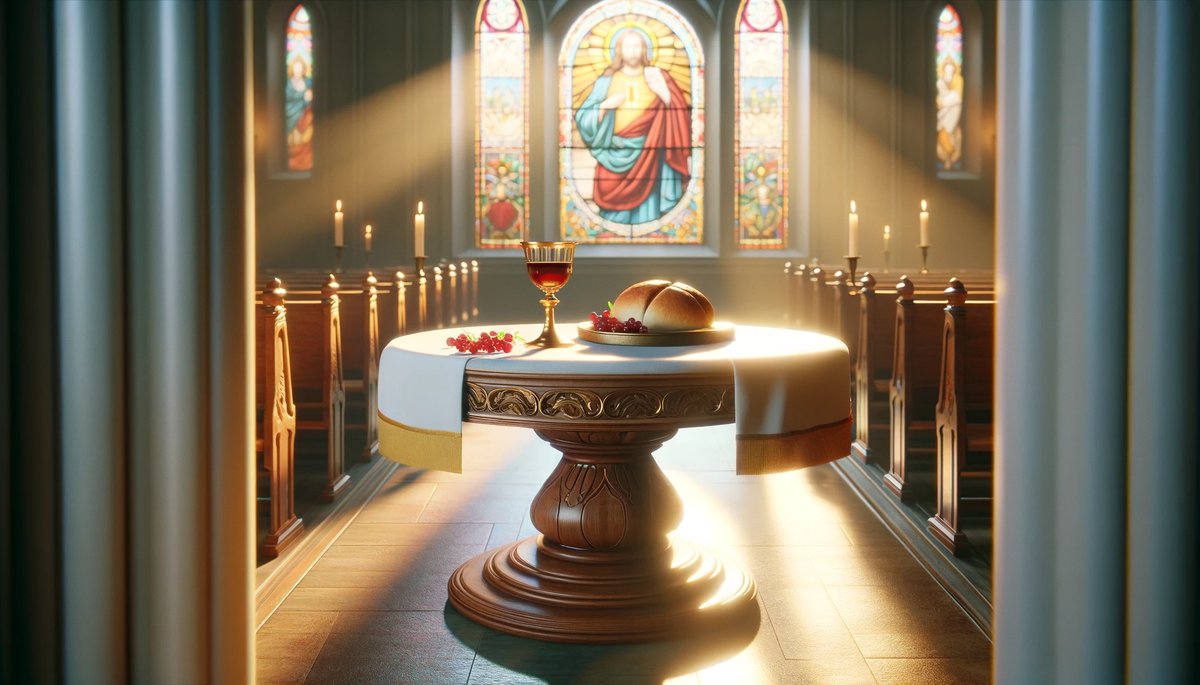Home>Theology and Spirituality>How Long Do You Have To Fast Before Receiving Communion


Theology and Spirituality
How Long Do You Have To Fast Before Receiving Communion
Published: February 19, 2024
Jason DeRose, Managing Editor at Christian.net, uses his expertise in religion and journalism to deepen understanding of faith's societal impacts. His editorial leadership, coupled with a strong academic background, enriches the platform’s diverse content, earning him recognition in both journalism and religious circles.
Learn about the fasting requirements for receiving communion and the theological significance of this practice. Explore the spiritual aspects of fasting in theology and spirituality.
(Many of the links in this article redirect to a specific reviewed product. Your purchase of these products through affiliate links helps to generate commission for Christian.net, at no extra cost. Learn more)
Table of Contents
Introduction
Fasting before receiving communion is a practice deeply rooted in the traditions of many Christian denominations. It is a spiritual discipline that holds significant theological and practical implications for believers. The act of fasting, in this context, involves abstaining from food and sometimes drink for a specific period before partaking in the Eucharist, or Holy Communion.
The concept of fasting before communion is not only a matter of religious observance but also a reflection of the reverence and solemnity associated with the sacrament. It is a time-honored tradition that has evolved over centuries, influenced by diverse theological perspectives and cultural contexts. Understanding the historical, theological, and practical aspects of fasting before communion is essential for appreciating its significance in the life of the church and individual believers.
In this article, we will delve into the historical background of fasting before communion, exploring its origins and evolution within the Christian tradition. We will also examine the varying fasting requirements across different church denominations, shedding light on the diverse practices that have emerged over time. Furthermore, we will explore the theological underpinnings of fasting before communion, considering the spiritual significance and doctrinal interpretations associated with this practice.
Additionally, we will address practical considerations related to fasting before receiving communion, offering insights into how individuals navigate this aspect of their faith within the complexities of modern life. By examining these facets, we aim to provide a comprehensive understanding of the role of fasting in preparing for communion and its relevance in contemporary Christian worship.
As we embark on this exploration, it is important to approach the subject with an open mind, recognizing the rich tapestry of traditions and beliefs that contribute to the diverse practices surrounding fasting before communion. Through this journey, we will gain a deeper appreciation for the spiritual depth and cultural nuances inherent in this ancient discipline, illuminating its enduring significance in the lives of believers today.
Read more: Why Fast An Hour Before Communion
Historical Background of Fasting Before Communion
The practice of fasting before receiving communion has deep historical roots within the Christian tradition, dating back to the early centuries of the church. In the ancient Christian communities, the Eucharist held profound significance as the central act of worship, symbolizing the spiritual nourishment and unity of believers. Fasting before partaking in the Eucharist was regarded as a solemn preparation, aligning with the reverence and sanctity attributed to the sacrament.
During the formative years of Christianity, fasting before communion was intertwined with the broader ascetic practices prevalent among early Christians. Asceticism, characterized by self-discipline and abstinence, was a fundamental aspect of spiritual life in the early church. Fasting, in particular, was viewed as a means of purifying the body and soul, preparing individuals for the sacred encounter with the body and blood of Christ in the Eucharist.
As the church expanded and diversified geographically, regional variations in fasting practices before communion began to emerge. Different cultural contexts and theological emphases contributed to the evolution of fasting traditions within various Christian communities. The duration and rigor of fasting varied, influenced by factors such as local customs, doctrinal interpretations, and the guidance of church leaders.
The early church fathers, including figures such as St. Augustine and St. John Chrysostom, addressed the significance of fasting before communion in their writings, underscoring its spiritual importance and the need for devout preparation. Their teachings and pastoral guidance played a pivotal role in shaping the understanding of fasting within the context of the Eucharist, emphasizing the connection between self-discipline and spiritual readiness for receiving the sacrament.
Throughout the medieval period, fasting before communion became more formalized within the liturgical practices of the church. The Council of Nicaea in 325 AD and subsequent ecumenical councils deliberated on matters related to the Eucharist, contributing to the establishment of guidelines for fasting and preparation before receiving communion. These deliberations underscored the communal and ritualistic aspects of fasting, aligning it with the broader framework of liturgical worship.
The historical trajectory of fasting before communion reflects the interplay of theological, cultural, and liturgical dynamics that have shaped the practice over centuries. This rich tapestry of historical influences has contributed to the diverse fasting traditions observed within contemporary Christian denominations, underscoring the enduring legacy of this ancient spiritual discipline.
Different Church Traditions and Their Fasting Requirements
The fasting requirements before receiving communion vary significantly across different Christian denominations, reflecting the diverse theological perspectives and cultural contexts within the global body of believers. These traditions encompass a spectrum of fasting practices, encompassing variations in the duration, types of abstinence, and the underlying rationale for fasting before partaking in the Eucharist.
In the Eastern Orthodox Church, fasting holds a central place in the preparation for communion. The faithful are expected to observe a period of abstinence from certain foods, including meat, dairy, and fish, in the days leading up to receiving the Eucharist. This practice, known as the Eucharistic fast, is rooted in the concept of spiritual purification and self-discipline, aligning with the ascetic ethos of Orthodox spirituality. The duration of the Eucharistic fast varies, with some adherents fasting from midnight before receiving communion, while others observe a shorter period of fasting from the previous evening.
Roman Catholic traditions also emphasize the importance of fasting before communion, albeit with variations in the contemporary practices compared to earlier centuries. The Code of Canon Law prescribes the requirement of fasting for at least one hour before receiving the Eucharist, encompassing abstaining from food and drink, with exceptions for water and medicine. This minimal fasting period is intended to underscore the reverence and preparation necessary for approaching the sacrament of the Eucharist.
In Anglican and Episcopal traditions, the fasting requirements before communion exhibit a degree of flexibility, allowing individual discretion within the broader framework of spiritual preparation. While the emphasis on fasting may not be as stringent as in some other denominations, the underlying principle of self-examination and readiness for partaking in the Eucharist remains integral to Anglican liturgical practice.
Protestant denominations encompass a wide range of fasting practices before communion, reflecting the diversity of theological perspectives and worship traditions. Some Protestant churches maintain fasting as a voluntary and personal act of devotion, allowing congregants to discern their own approach to spiritual preparation before receiving communion. Others may incorporate elements of fasting within the broader context of communal worship, aligning with the doctrinal emphases and liturgical expressions of their respective traditions.
The varying fasting requirements across different church traditions underscore the multifaceted nature of fasting before communion, encompassing a rich tapestry of practices that reflect the theological distinctives and historical legacies of each denomination. These diverse traditions contribute to the vibrant mosaic of Christian worship, highlighting the enduring significance of fasting as a spiritual discipline within the life of the church.
Theological Perspectives on Fasting Before Communion
The theological perspectives on fasting before communion encompass a rich tapestry of doctrinal interpretations and spiritual significance within the Christian tradition. At the heart of these perspectives lies a profound exploration of the relationship between the physical act of fasting and its spiritual implications for the communion experience.
Central to the theological understanding of fasting before communion is the concept of self-discipline and spiritual preparation. Fasting is viewed as a means of cultivating a heightened awareness of one's dependence on God and a deepened sense of reverence for the sacrament of the Eucharist. By voluntarily abstaining from food and drink, believers engage in a tangible expression of their commitment to spiritual readiness, aligning their physical bodies with the sacred encounter of partaking in the body and blood of Christ.
The theological underpinnings of fasting before communion also emphasize the theme of purification and sanctification. Through the act of fasting, individuals seek to purify their hearts and minds, preparing themselves to receive the Eucharist with a sense of inner clarity and spiritual attentiveness. This purification process is intricately linked to the broader theological understanding of the Eucharist as a transformative encounter, wherein believers are nourished and renewed through their participation in the body and blood of Christ.
Furthermore, theological perspectives on fasting before communion often underscore the communal and liturgical dimensions of the practice. Fasting is not merely an individual exercise but a communal expression of unity and shared devotion within the worshiping community. It serves as a unifying element that binds believers together in their collective preparation for the sacred act of partaking in the Eucharist, reinforcing the interconnectedness of the body of Christ.
Additionally, theological reflections on fasting before communion delve into the scriptural foundations and historical precedents that inform this spiritual discipline. Drawing upon biblical narratives and the teachings of early church fathers, theologians articulate the theological continuity of fasting as a preparatory practice for encountering the divine presence in the Eucharist. This historical and scriptural rootedness lends depth and resonance to the theological significance of fasting before communion, anchoring it within the broader narrative of Christian worship and spiritual formation.
In essence, the theological perspectives on fasting before communion illuminate the multifaceted dimensions of this ancient discipline, weaving together themes of self-discipline, purification, communal unity, and scriptural continuity. Through these theological lenses, fasting before communion emerges as a profound expression of faith and a transformative pathway toward encountering the sacred mysteries of the Eucharist.
Practical Considerations for Fasting Before Receiving Communion
Navigating the practical aspects of fasting before receiving communion involves a nuanced approach that takes into account individual circumstances, health considerations, and the evolving dynamics of contemporary life. While the spiritual significance of fasting before communion is paramount, practical considerations play a crucial role in shaping how individuals engage with this ancient discipline within the complexities of modern society.
One of the primary practical considerations for fasting before receiving communion revolves around the physical well-being of individuals. It is essential to recognize that not everyone may be able to adhere to strict fasting requirements due to health conditions or other mitigating factors. In such cases, the pastoral guidance of clergy and the understanding of the faith community can provide a supportive framework for individuals to participate in communion while honoring their health needs.
Moreover, the realities of hectic schedules and demanding responsibilities in today's world present practical challenges for observing extended fasting periods. Balancing work, family commitments, and other obligations may necessitate a flexible approach to fasting before communion. Many church traditions acknowledge these practical constraints and offer pastoral guidance that encourages a spirit of intentionality and mindfulness in preparing for communion, even within the constraints of busy lifestyles.
In the context of diverse cultural and culinary practices, practical considerations for fasting before receiving communion also encompass sensitivity to individual dietary habits and food traditions. As the global Christian community encompasses a rich tapestry of cultural diversity, acknowledging and respecting the culinary customs of congregants is integral to fostering inclusivity and understanding within the context of fasting practices.
Furthermore, the practical dimensions of fasting before communion extend to the pastoral care and support provided by church leaders. Pastors, priests, and clergy members play a vital role in offering pastoral guidance that takes into account the practical realities faced by individuals as they seek to observe the spiritual discipline of fasting. Their compassionate and discerning approach can help individuals navigate the intersection of spiritual devotion and practical considerations, fostering a sense of inclusion and understanding within the faith community.
Ultimately, the practical considerations for fasting before receiving communion underscore the importance of approaching this spiritual discipline with a spirit of compassion, understanding, and pastoral sensitivity. By embracing a holistic approach that honors the spiritual significance of fasting while acknowledging the practical complexities of contemporary life, individuals can engage in the preparation for communion with a sense of reverence, authenticity, and inclusivity.
Read more: How Do You Receive Holy Communion
Conclusion
In conclusion, the practice of fasting before receiving communion is a multifaceted and deeply significant aspect of Christian worship, encompassing rich historical, theological, and practical dimensions. Throughout the centuries, fasting before communion has been intricately woven into the fabric of Christian tradition, reflecting the spiritual devotion, communal unity, and theological depth inherent in the sacrament of the Eucharist.
The historical background of fasting before communion reveals its ancient roots within the early Christian communities, where it was intertwined with broader ascetic practices and held as a solemn preparation for partaking in the Eucharist. The evolution of fasting traditions across different church denominations reflects the diverse theological perspectives and cultural contexts that have shaped the varying fasting requirements observed today.
From a theological standpoint, fasting before communion is imbued with profound significance, encompassing themes of self-discipline, purification, communal unity, and scriptural continuity. It serves as a transformative pathway toward encountering the sacred mysteries of the Eucharist, fostering a heightened awareness of spiritual readiness and reverence for the divine presence.
Practical considerations for fasting before receiving communion underscore the need for a nuanced and compassionate approach that acknowledges individual circumstances, health considerations, and the complexities of modern life. Balancing the spiritual significance of fasting with practical realities, such as health conditions and busy schedules, requires pastoral sensitivity and understanding within the faith community.
As we reflect on the diverse facets of fasting before communion, it becomes evident that this ancient discipline continues to hold profound relevance in the lives of believers today. It serves as a tangible expression of faith, a communal act of worship, and a transformative journey of spiritual preparation. By embracing the historical, theological, and practical dimensions of fasting before receiving communion, individuals and communities can engage in this sacred practice with a sense of reverence, inclusivity, and authenticity, enriching their experience of the Eucharist and deepening their spiritual journey within the Christian faith.














